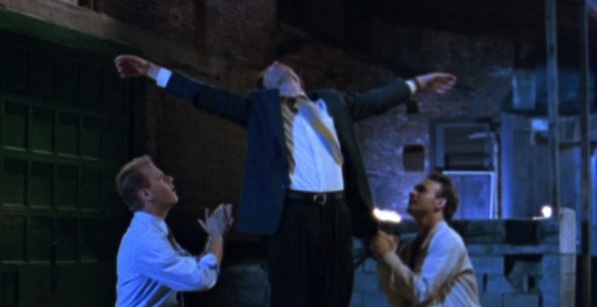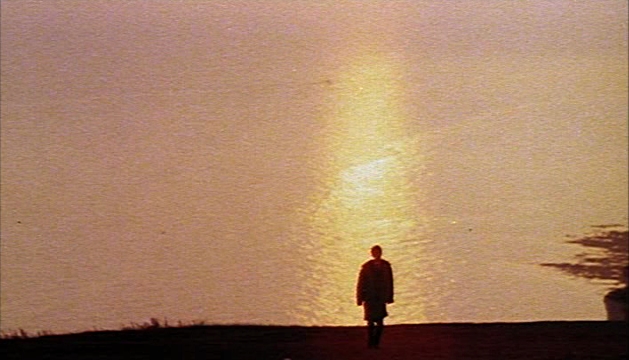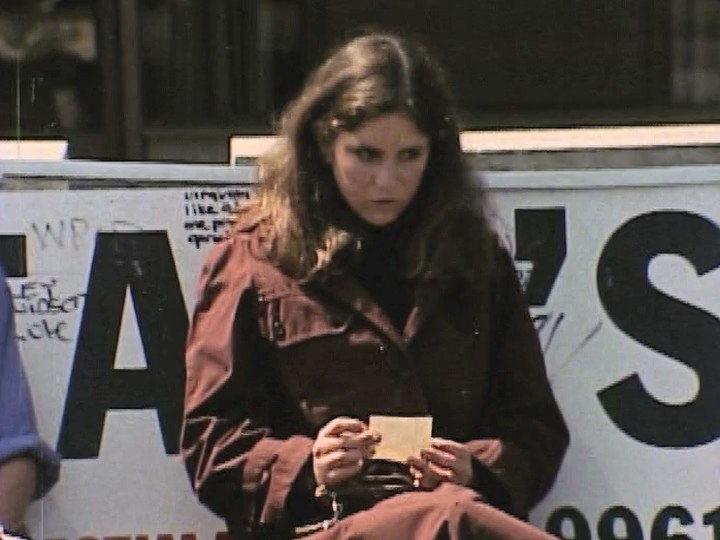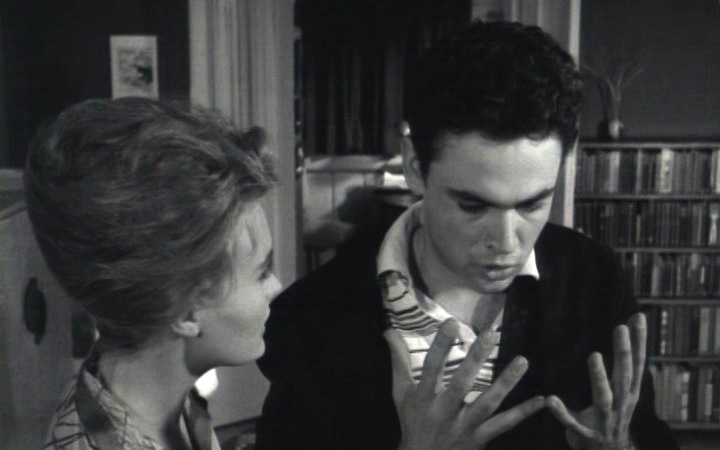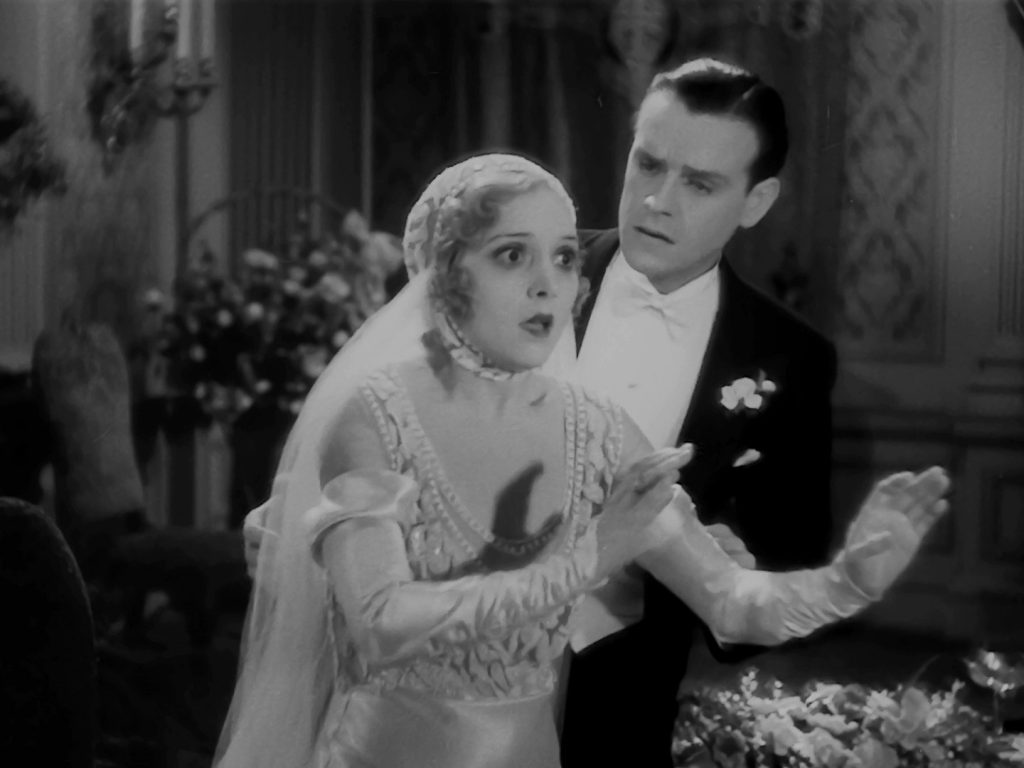Perhaps the bombastic sex in Jim McBride’s Breathless made the proposition of intimacy troubling for you; maybe Orson Welles’s The Trial nurtured your guilt into a pheromone detectible by K9s; or were you the unfortunate child taken to Jaws because Mom confused it for an animal movie? You probably have movie regrets—most do—but do you have movie wishes? If you could go back in time and speak with your younger self, would you tell it to see La Chinois and question your politics? Or watch It’s a Wonderful Life and charge the imaginary you to grow a community-like a garden to sustain all you loved? Just imagine the possibilities, all that life could have been, if….
You’ve seen a lot of films at the wrong time: you were too young for L’age d’or, too old for The Mask, not perceptive enough to enjoy Adam’s Apples. Yet some mistimed movies don’t bother you much; they’re forgettable because they didn’t take hold. Imagine if you’d seen Scott Pilgrim Saves the World when you were just the right age: young enough to find it terminally hip and old enough to understand the erogenous threat of fighting your GF’s ex-GF. (Is she cuter than you are?) If those experiences lead to a collision so great your worldview shakes, you might call that movie your favorite. We don’t always see our favorites in ideal circumstances, but usually we see them at ideal times—you were right and it was right and the chemistry created fireworks.
Knowing how magical that can be, and how circumstances conspire without us, we sometimes cling to DVDs, rip files or pray things never leave the security of a YouTube link—but our consumption has always been victim to chance. That can make us think these magic films are choosing us and not the other way around, and if only we could see them at the perfect age, what mistakes we might have avoided… this is nostalgia reversed.
Cineaste Heal Thyself
Humans could be better at preventative measures; most of us see our mistakes only after we’ve suffered their consequences. Surely we’ll castigate the Jaws-attending mother for not reading reviews and “an ounce of prevention is better than a pound of cure” but why aren’t we our own best preventionists?
I saw Quadrophenia at twenty-five, old enough to watch it like an anthropology student, admiring costumes and retro mod-rock. I could see it as a spiritual sequel to Grease—a winking ballad written by an adult to his younger self—and a great way to embarrass a once and future Sting. But if I’d seen Quadrophenia at fifteen, I would have reveled in the guyliner and identified with the narcissistic cultural torment. Imaginary fifteen-year-old me would have interrogated the sincerity of my friends; they were all united by a shared love of modern rock and an abject confusion about personal philosophy (Oh God, the fights over Ayn Rand we had!). My teen years were wildly, anxiously, unreasonably fueled by cultural products and my relationships were underdeveloped because instead of practicing interactions and having conversations we were frenetically consuming concerts and shit VHS tapes. I left Naked Lunch, a film I saw at fourteen because I was hip enough to hang with seniors, worrying the theater had morphed into a fleshy coffin, coating me with a veneer of bug spray and chemically produced sin. A film I didn’t remotely understand affected me terribly and I feared it strong enough to raise my eligibility for hell. But Quadrophenia might have cracked that misperception wide open—and why not? The Who has saved many! I might have looked past my social circle, thought about my confused goals and the meaninglessness of saving barista tips to see Tori Amos live. Imaginary me might have grown up early and that would have made life so much easier. I wish I knew what I know now….
Even though I Hate that Song
It’s invisible how movies teach us. My affection for educational films is the result of self-awareness: my mind learns particularly well from film—indeed better than from most teachers or books. With educational films I can at least learn directly and with fewer half-truths. If someone in a period piece is reading a newspaper to demonstrate the story is happening thirty-four years ago in Cheboygan, I’ll remember those headlines without interrogation. It’s invisible and insidious, like education backmasked, and I don’t even know I’ve learned anything. I am not alone in this; it’s not unique to me. Television studies has a word to describe this: ambience.
Your feelings, however, aren’t ambient. They can be ambivalent and you can suffer such abstractions as indignity and it’ll weigh on your mortal soul just like those flouncy, important books say it will. It’s precisely then a social hygiene film like Saying No could intrude on your embarrassed confusion and tell you, with the authority of a licensed radio psychiatrist, that choosing something as life changing as sex is a neutral decision to be determined with your bigger plans in mind. You are more than your virginity, and the fear Sylvia Plath and Mary McCarthy have let settle into your pelvic bones will not define you. Say “no” because you are in charge of yourself. Say “no” and don’t be pushed around. Say “no” and saying “yes” can mean something. Imaginary me could write bad poetry about the urgency of this information. (Imaginary me is masterful at conjuring sharp poignancies.)
Most ‘Crazy’ People Self-Diagnosed
Pop psychology throws around damning phrases like “self-sabotage” in such slight and familiar contexts you’re prone to believe losing your keys is your psyche’s way of demanding “stay home.” Gratefully, schlock and Z-grade horror thinks our anxieties are their playground, providing us vivid and silly allegories built to lampoon our worries to death. The Crawling Hand literally tells a suggestible student to kill for it…watch that and know you can cause your own problems without having a major psychosis on your hand.
Yet in youth our feelings are outsized, monumental, boundless, and they don’t yield to logic easily. Injustices loom and inspire protest. Ardor grips us and asks no permission. We’re slaves to desire, and determined to fight for…whatever’s bugging us right then. My sixth grade resembled Culloden—not that my troubles were as life threatening as that of Irishmen forced to fight for their British landlords in 1745. Wow, how narcissistic and promiscuous young feelings can be. We see ourselves in the crises of others, regardless how projected our suffering may be—but we are talking about seeing ourselves in projections anyway (movies).
Peter Watkins would have changed my life if I’d “met” him before I was thirty. He has a way of laying things unceremoniously bare that stuns you out of stupor. That’s how Edvard Munch (another Watkins “doc”) could have helped. It revels in the imagination of the painter as if the blessings of God were costly gifts. Consider your future: it’s fettered with unseen consequences, full of possibilities and bargains we don’t yet know are Faustian. Oh, what is greatness anyway? Why want something that leads to trouble?
Janet Gaynor didn’t want trouble. She didn’t ask Fredric March to marry her (A Star is Born). She humbly approached Hollywood with focus and vulnerability and her ascending star swiftly convinced her soused hubby to suffer, believing she outshines him. He’d douse his ego with liquor no matter whom he wed—it’s a condition and maybe he’s a type—but he left her signs of his weak character, his whims and neediness. He just revealed himself when she was busy, because that’s how it happens.
Calm Down
It’s not until you can recognize the sting of nostalgia or the soft glow of regret that you start to realize you didn’t get it, you botched the lesson, you were out sick that class. Sometimes it’s maturity we lack—a balance in our perspective that helps us view conflicts from both sides. If I’d seen David Holzman’s Diary at eighteen, I wouldn’t have understood it was a comedy, but I might have watched David exploit his model girlfriend and seen the logic of his perversion in those around me: “you’ll learn by watching this again? Why don’t you pay attention the first time?” I learn by film best, too, so who am I to hate Holzman? But what you do with/in film is measured by a different yardstick than your actions independent of the apparatus. Even if you can’t articulate a lesson, it could still protect you.
It hurts to forgive Holzman but we’ve all acted without thinking. We’ve also behaved in ways informed by others—that doesn’t make us puppets, and if it does that’s a temporary prison. If you fear you’re too suggestible, there’s something about murky old zombie movies that sheds a light. The mythos of living dead is at it’s least visceral in White Zombie which means you can see the implications of automatons and over lording without falling under any spell. In fact, the process of falling under a spell is so self-conscious you see it coming at you like an oddly dressed Hungarian with a widow’s peek. Even at its purest, it’s demystified by distance.
Hal Hartley’s Surviving Desire is poignant and funny in all the right ways, confused about the division between life and art among people who practice one better than the other. Under its urbane layers it’s about bodies in motion, urged by motivations that are confused but often so basic all our cultural baggage and the festoonage of our social stations look laughable. We’re animals and these are bodies, and our interpretations of each other are a muddle, but it’s not insufferable. Take comfort knowing no one gets off easy.

